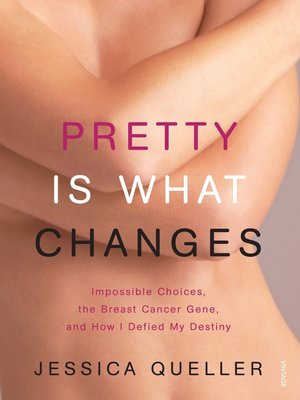Pretty Is What Changes
ebook ∣ Impossible Choices, The Breast Cancer Gene and How I Defied My Destiny
By Jessica Queller

Sign up to save your library
With an OverDrive account, you can save your favorite libraries for at-a-glance information about availability. Find out more about OverDrive accounts.
Find this title in Libby, the library reading app by OverDrive.



Search for a digital library with this title
Title found at these libraries:
| Library Name | Distance |
|---|---|
| Loading... |
When genetics can predict how we may die, how then do we decide how to live?
In Pretty Is What Changes, Jessica Queller journeys to the place where the cutting edge of biotechnology meets real life and real patients. Eleven months after her mother succumbed to cancer, Queller had herself tested for the BRCA "breast cancer" gene mutation. The results came back virulently positive, putting her at a terrifyingly elevated risk of developing breast cancer before the age of fifty and ovarian cancer in her lifetime.
Thirty-five, unattached, and yearning for marriage and a family of her own, she faced an agonizing choice: a lifetime of vigilant screenings and a commitment to fight the disease when caught, or its radical alternative—a prophylactic double mastectomy that would effectively restore life to her, even as it would challenge her most closely held beliefs about body image, identity, and sexuality.
Informed, courageous, and armed with wit and style, Queller takes us on an odyssey from the frontiers of science to the private interiors of a woman's life. Without flinching, she answers a question we may one day face for ourselves: if genes can map our fate and their dark knowledge is offered to us, will we willingly trade innocence for the information that could save our lives?
In Pretty Is What Changes, Jessica Queller journeys to the place where the cutting edge of biotechnology meets real life and real patients. Eleven months after her mother succumbed to cancer, Queller had herself tested for the BRCA "breast cancer" gene mutation. The results came back virulently positive, putting her at a terrifyingly elevated risk of developing breast cancer before the age of fifty and ovarian cancer in her lifetime.
Thirty-five, unattached, and yearning for marriage and a family of her own, she faced an agonizing choice: a lifetime of vigilant screenings and a commitment to fight the disease when caught, or its radical alternative—a prophylactic double mastectomy that would effectively restore life to her, even as it would challenge her most closely held beliefs about body image, identity, and sexuality.
Informed, courageous, and armed with wit and style, Queller takes us on an odyssey from the frontiers of science to the private interiors of a woman's life. Without flinching, she answers a question we may one day face for ourselves: if genes can map our fate and their dark knowledge is offered to us, will we willingly trade innocence for the information that could save our lives?







